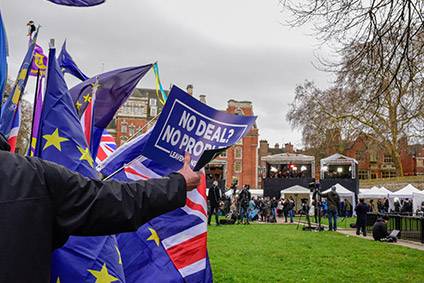Temperatures have cooled a little in the UK this week – London is at 24°C (75.2°F) at the time of writing, rather than Thursday’s 38°C (100.4°F) – but the political news of the last seven days means the frustrations many of you have over Brexit are still running high.
So the UK has a new hand at the helm, with Boris Johnson formally succeeding Theresa May as Prime Minister on Wednesday. A supporter of the UK’s departure from the EU, Johnson has, while insisting he would prefer a deal with the bloc on the terms of Brexit, struck a harder tone on the prospect of no-deal and this week appointed a Cabinet seen as being loaded with more fervent supporters of the country’s leaving – with or without a deal.
The chances of the UK and the EU striking a deal by 31 October appear remote. In the five days since Johnson was announced as Prime Minister, there have been statements on both sides of the English Channel that suggest the chances of finding common ground are slim. On Friday, the UK government played down the prospect of talks with the EU reopening until Brussels agrees to change its stance on the Irish backstop. Michel Barnier, leading the Brexit talks for the EU, has already described that position as “unacceptable”.
Yesterday, Michael Gove, the former UK Environment, Food and Rural Affairs Secretary now with a new position in the Johnson Cabinet, said the country’s government is now “working on the assumption” of a no-deal Brexit. Writing in The Sunday Times, he added: “No deal is now a very real prospect.”
For all that, there is no appetite in the UK parliament for the country to leave the EU without a deal, suggesting should Johnson’s government move to do so, it would be voted down. And then? Commentators believe the new Prime Minister could call a General Election to try to give the Conservative Party its own working majority – and its own mandate to push through no deal.
Where does this leave the food industry?

US Tariffs are shifting - will you react or anticipate?
Don’t let policy changes catch you off guard. Stay proactive with real-time data and expert analysis.
By GlobalDataToday, UK business organisation The Confederation of British Industry said it believes neither the UK nor the EU is ready for a no-deal Brexit – and the CBI’s comments Brussels is less prepared for the potential impact a no-deal Brexit could have on the agri-food sector than the UK will be scant consolation for business.
The Food and Drink Federation, the trade body representing food manufacturers doing business in the UK, last week warned Johnson leaving the EU without a deal could do “mortal damage” to the sector.
Unilever chief Alan Jope, meanwhile, said last week the Magnum maker was “planning for a worst-case scenario but hoping for the best” on Brexit. In some ways that is probably the best any food business selling into or out of the UK can do right now, although it could be argued a company the size of Unilever may be more able to withstand any damage from no-deal than the thousands of smaller businesses that depend on the frictionless trade between the UK and the EU, the future of which remains so much up in the air.





